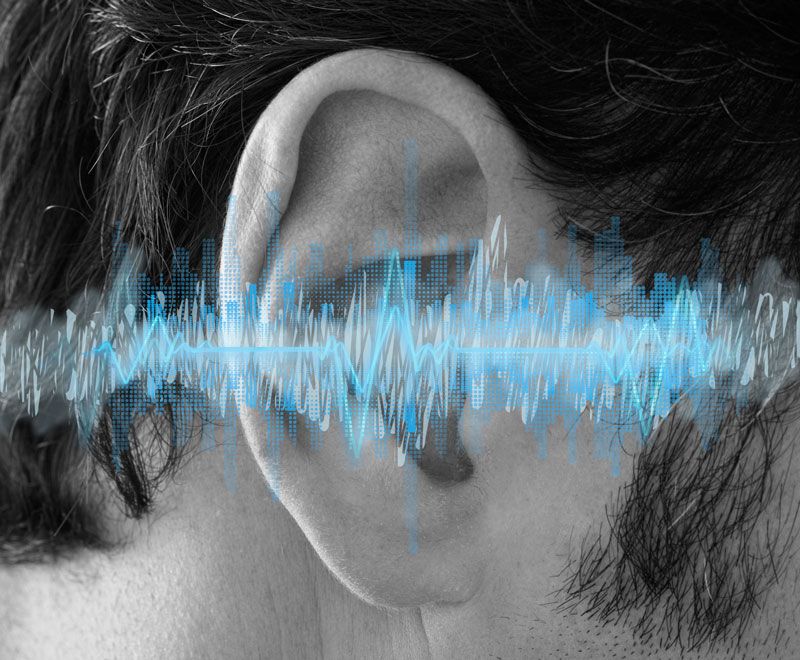Over 50 million Americans have symptoms of tinnitus according to the U.S. Centers for Disease Control. Many people do not know how to treat their symptoms so they never experience relief from this condition. Tinnitus occurs when the auditory system picks up noise without there actually being any outside sounds. This noise is often in the form of roaring, ringing, or whistling and can vary between being loud or soft. Patients who already have some degree of hearing loss tend to notice symptoms of tinnitus more persistently because their world is much quieter. For those who do not already have hearing loss the “ringing” sounds usually get louder at night before you go to bed because your environment is quieter.
Causes of tinnitus can include fluid behind the eardrum, head and neck trauma, ear wax buildup, hearing loss, or medications. Unfortunately, there is no cure for tinnitus. However, you can get relief through a variety of treatment plans that include the use of hearing aids, medication, counseling, or external sound generators. You don’t have to live with the frustration of tinnitus—our audiologist can find you relief.
Acoustic Therapy

Sounds are used to cover up, or mask, the tinnitus. This distracts your brain and helps you tune out the ringing in your ears. Electronic devices that produce white noise, air conditioners, fans, soft music, etc. can all be employed.
There are a range of sound therapy options you can employ including audio files, sleep noise generators, tinnitus specific ear buds and more. These acoustic therapy methods are designed to habituate a tinnitus sufferer to their symptoms by reducing the contrast between the tonal sounds they hear and their environment. This allows the brain to blend and mask tinnitus sounds with natural and therapy added environmental noises.
Tinnitus Retraining Therapy
Similar in concept to acoustic therapy, tinnitus retraining therapy utilizes a portable sound generator that produces soft patterned tones to help desensitize the brain to the sounds of tinnitus.
One of the latest iterations of tinnitus retraining therapy is called acoustic neuromodulation. Using a combination of computer software, self-reporting and ongoing hearing tests, a specialist can create a custom tone profile designed to treat your specific tinnitus tones. The profile can be adjusted as needed over time.
Steroid Injections
Meniere’s disease has a number of symptoms, including hearing loss, tinnitus and vertigo that fluctuate due to increased fluid pressures in the ear organs. The resulting hearing loss and tinnitus can be treated with a series of injections of a potent steroid, which has an 85 percent chance of reducing symptoms.
Surgery
As many as 80 percent of those with a benign tumor of the cranial nerve that connects the inner ear and the brain known as an acoustic neuroma also suffer from tinnitus. The tinnitus may be resolved through a surgical removal of the acoustic neuroma.
Hearing aids
A common treatment option utilizes hearing aids, as nearly 90 percent of those with tinnitus also experience hearing loss. Hearing aids are used to amplify background sounds, which can mask tinnitus. These devices can also help you distinguish one sound from another, improving communication and helping with focus and concentration difficulties. Many hearing aids come packaged with noise generators to replace ambient sounds if amplification alone does not reduce tinnitus.
Counseling
Counseling and cognitive behavioral therapy (CBT) can be practical in helping you manage your tinnitus symptoms by reducing the stress, anxiety and sleeplessness that are often associated with tinnitus. Our providers teach some methods to help you manage your tinnitus symptoms but may refer you for ongoing CBT.
Behavioral therapy can be very effective and provide a range of coping skills that can help you manage tinnitus symptoms and the associated stress and depression that often accompany the condition.
Treatment Is Just a Phone Call Away
Treatment begins with a thorough tinnitus evaluation; it is the first step in determining the cause of your tinnitus when a physical cause is present. Though not all tinnitus symptoms can be treated, nearly every patient can benefit from management and therapy.
You don’t have to settle for your symptoms. Call us today for scheduling.
Call Benjamin Liess MD at (207) 415-4841 for more information or to schedule an appointment.